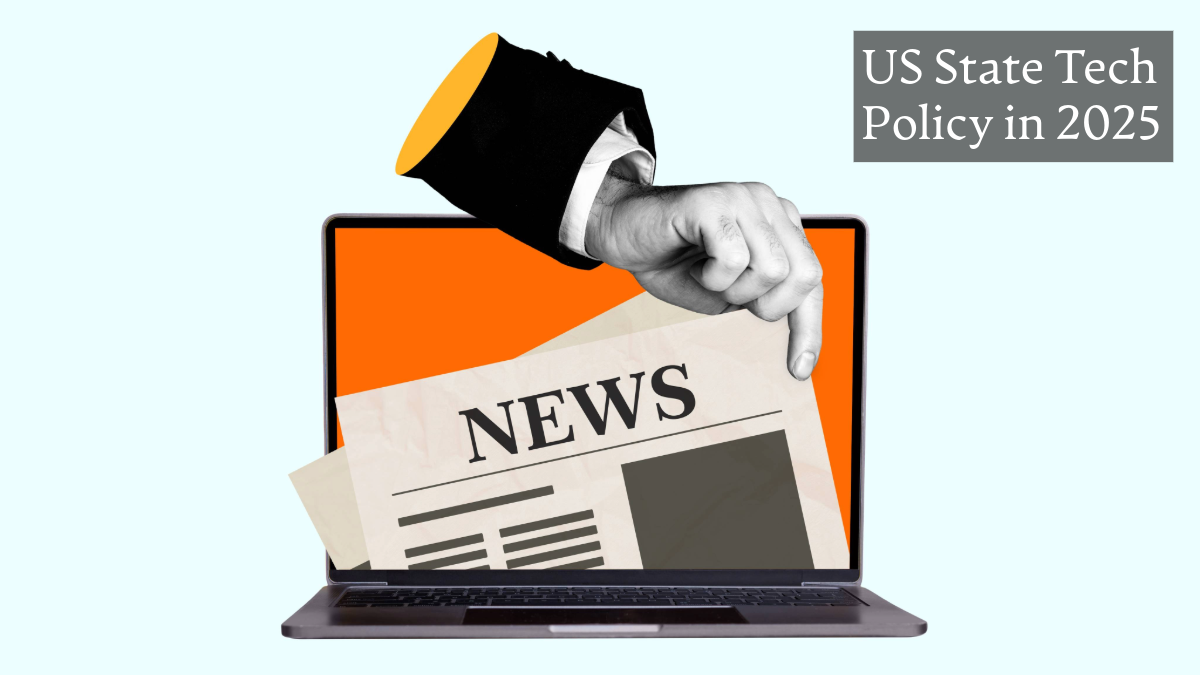Considering State Tech Policy Priorities on News and Information Issues for 2025
Amy S. Mitchell / Jan 9, 2025As the United States prepares to welcome President-elect Donald Trump and his administration in January, experts are assessing how a Republican-controlled government could reshape the tech policy landscape in the coming years. However, tech policy is not only made at the federal level. It is equally important for policymakers, researchers, technology experts, media organizations, and civil society groups to pay close attention and be involved in the state-level tech policy landscape heading into 2025.
Many of the tech policy concerns that states prioritized in the last four years are expected to remain on the front line of the tech policy agenda, several of which intersect with news and information. These issues include synthetic media and deepfake legislation, media remuneration legislation, AI regulations, open internet regulations, and policies to protect journalists from digital threats.
In following current trends, state-level policy discussions around these issues will likely gain momentum. Sound public policy in these areas is critical to addressing everyday needs, such as ensuring access to reliable, fact-based information and mitigating risks posed by emerging technologies while enabling benefits and safeguarding the incorporation of AI in the digital landscape. It is vital, then, to prioritize robust research and collaborative, cross-sector thinking to craft policies that not only serve the American public but also protect democratic values of an independent news media, freedom of expression, and an open internet.
Since its founding in 2023, the Center for News, Technology and Innovation (CNTI) has actively analyzed and provided resources on these critical issues to support informed decision-making for policymakers. As lawmakers consider state-level legislation on these issues, CNTI hopes its issue primers and comprehensive reports below can serve as a resource for informed policy discussions.
Synthetic Media, Fakes News & Disinformation
In 2024, several states – such as Florida, Texas, Louisiana, South Dakota, New Mexico, and Washington – enacted legislation to regulate the creation and distribution of deepfake images and videos. In 2025, it is expected that similar state-level policies continue to be introduced across the country. Synthetic media and deepfakes are a complex issue that needs to be closely researched and examined to address concerns while also considering freedom of expression and safety. CNTI’s Synthetic Media & Deepfakes Issue Primer outlines how this content affects AI use in journalism, journalists, fact-based news and mis- and disinformation and the state of research on legislation intended to address this issue.
Alongside the emergence of synthetic media and deepfakes is the continuing challenge of disinformation and content moderation. CNTI’s analysis of “fake news” legislation recently introduced or enacted around the globe revealed the risks to journalism and information access, whether intended or unintended. While this issue has to date been mainly debated on the federal level, similar legislation can be expected to be introduced state by state in the future. CNTI’s Addressing Disinformation Issue Primer outlines the complexities of combating disinformation, the state of research, and the current research landscape.
Media Remuneration Policies
One impact of the digital transformation of our news systems has been the “unbundling” of news information and the upending of journalism’s financial model, sparking the introduction and enactment of media remuneration legislation at the state and federal levels. Following the passing of the California Journalism Preservation Act (CJPA) in the California Senate, we anticipate that similar state-level legislation will be introduced across the country. One state that has already introduced legislation that will likely be reintroduced is Illinois with the IL JPA. As states consider these media remuneration policies, CNTI offers its recent analysis of media remuneration legislation and Building News Economic Sustainability Issue Primer, which can serve as a framework for navigating how to most effectively support the future of journalism and a vibrant digital ecosystem.
Protecting an Open Internet
Over the past few years, state legislatures in the US have introduced measures to protect an open internet and access to information. Specifically, discussions on enforcing the principles of net neutrality, which prevent internet service providers from blocking certain content. Since President-elect Trump opposed net neutrality during his previous term, it can be expected that states who support net neutrality will introduce legislation. CNTI’s Protecting an Open Internet Issue Primer explains the importance of protecting an open internet to encourage functioning, free societies, and the potential unintended consequences of legislative actions.
Journalistic Protections
Following the Senate Republican’s rejection of the PRESS Act in December, we may see state policymakers introduce similar legislation furthering journalistic protection at the state level. Digital and physical threats to journalists are on the rise. CNTI emphasized this issue and analyzed the current state of research and legislation in its Journalists & Online Abuse and Journalists & Cyber Threats Issue Primers and shared insights we can glean from other countries, such as Mexico, where journalists face near-constant threats to their safety and security.
While many state-level policies to be introduced in 2025 may be contingent on what is introduced on the federal level, it is evident that tech policy will be a priority agenda item on both levels. These issues are complex. Policymakers, technology companies, media companies, researchers, and other relevant stakeholders need to work together to navigate the changing technology landscape and determine how to best mitigate the risks and enhance the benefits of our innovative and evolving society.
This post is part of a series examining US state tech policy issues in the year ahead.
Authors

